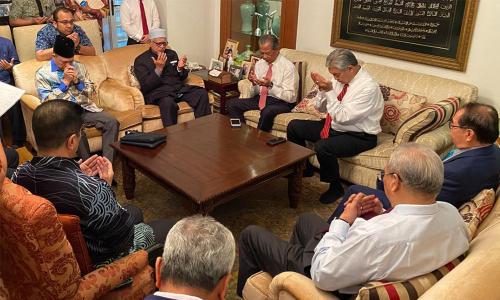COMMENT | Troubled ties among coalition partners in Putrajaya
COMMENT | Six months after the Perikatan Nasional (PN) government came together to take over the federal government, the divisions in the governing coalitions of convenience are openly apparent. Not a day goes by without one of the different component parties taking a jab at others, be it with calls for the resignation of fellow ministers to contradictory announcements on electoral partnerships.
Malaysians are familiar with this pattern. Public assurances by leaders only confirm that there are escalating problems within and among the varied (and confusing) coalitions of governing parties - Perikatan Nasional (PN), Muafakat Nasional (MN) and Barisan Nasional (BN).
Not all is well in the coalition partnerships of the parties governing Malaysia at the federal level, what I call the Putrajaya coalitions.
The PN 12-party government has not been able to translate these bonds into a viable electoral arrangement. Only four parties have formally announced they are part of PN (Bersatu, MIC, STAR and PAS) and debate surrounds seats, logo use, leadership and the position of different parties.
While smaller parties may still join PN, the failure of Muhyiddin Yassin’s coalition to evolve into an inclusive cooperative arrangement speaks to weakness. Despite holding the powerful position of the prime ministership, Muhyiddin lacks political gravitas to convince other parties to allow his arrangement to lead. The majority of PN government parties are happy being part of the Muhyiddin government, but prefer their own independence and allies in an electoral arrangement.
The only Malay party electoral pact, Muafakat Nasional, is also under pressure. MN faces internal revolts as leaders are forcing the grassroots to accept Bersatu’s membership, moving the partnership from two to three. Resentments are especially serious in states where tensions between Bersatu and the other component parties are high, e.g. Kedah and Johor.
Muhyiddin’s announced call that his party would enter MN showcased the recognition that his own PN coalition is not viable and reflected a bow to Umno pressure to follow their lead. Importantly, it also signalled that Bersatu is not strong enough on its own to win seats (even its own), and is willing to return to the Umno fold to secure seats. This has not gone down well in parts of Bersatu too, with many members leaving to join Mahathir’s party, Pejuang.
MN is a difficult arrangement at the grassroots levels as traditional opposition and competition, often highly personalised, are being asked to be put aside in the name of Malay ‘unity’.
RM12.50 / month
- Unlimited access to award-winning journalism
- Comment and share your opinions on all our articles
- Gift interesting stories to your friends
- Tax deductable

